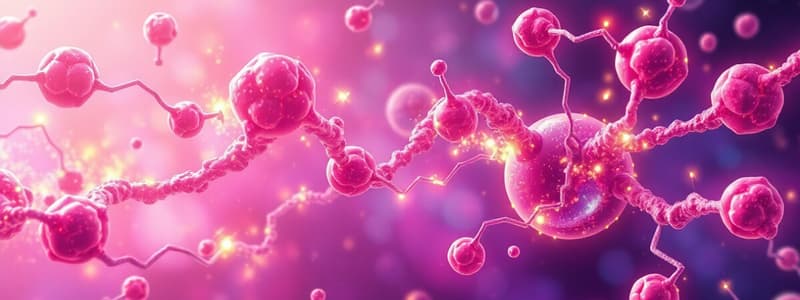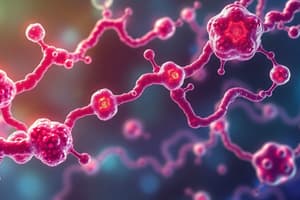Podcast
Questions and Answers
Which enzyme catalyzes the conversion of pyruvate to acetyl CoA?
Which enzyme catalyzes the conversion of pyruvate to acetyl CoA?
- Pyruvate carboxylase
- Alanine transaminase
- Pyruvate dehydrogenase complex (correct)
- Lactate dehydrogenase
What is required for gluconeogenesis from pyruvate?
What is required for gluconeogenesis from pyruvate?
- Alanine
- Oxalacetate (correct)
- Lactate
- Acetyl CoA
Which vitamin is thiamine pyrophosphate derived from?
Which vitamin is thiamine pyrophosphate derived from?
- Vitamin B5
- Vitamin B2
- Vitamin B1 (correct)
- Vitamin B3
What is a potential consequence of pyruvate dehydrogenase complex deficiency?
What is a potential consequence of pyruvate dehydrogenase complex deficiency?
Which molecule is produced during the citric acid cycle and directly contributes to ATP generation through substrate level phosphorylation?
Which molecule is produced during the citric acid cycle and directly contributes to ATP generation through substrate level phosphorylation?
What effect does high ADP concentration have on the regulation of the TCA cycle?
What effect does high ADP concentration have on the regulation of the TCA cycle?
What ultimately happens when fluoroacetate reacts with oxaloacetate?
What ultimately happens when fluoroacetate reacts with oxaloacetate?
How many NADH are produced for every turn of the citric acid cycle?
How many NADH are produced for every turn of the citric acid cycle?
What role does acetyl CoA play in metabolic pathways?
What role does acetyl CoA play in metabolic pathways?
Which of the following statements about the citric acid cycle is true?
Which of the following statements about the citric acid cycle is true?
Study Notes
Fates of Pyruvate
- Pyruvate can be converted to Acetyl CoA, Lactate, Oxalacetate, or Alanine
- Acetyl CoA: occurs in the mitochondria, requires the enzyme pyruvate dehydrogenase complex, needed for the citric acid cycle
- Lactate: occurs in the cytosol, requires the enzyme lactate dehydrogenase (LDH), produced during anaerobic glycolysis
- Oxalacetate: occurs in the mitochondria, requires the enzyme pyruvate carboxylase, needed for gluconeogenesis
- Alanine: occurs in the cytosol, requires the enzyme alanine transaminase (ALT)
Formation of Acetyl CoA from Pyruvate
- Pyruvate is converted to Acetyl CoA in the mitochondrial matrix by the pyruvate dehydrogenase complex
- This reaction is irreversible
- The pyruvate dehydrogenase complex is composed of three enzymes and five coenzymes
- Coenzymes are derived from water-soluble vitamins:
- Thiamine pyrophosphate, TPP (derived from thiamine, vitamin B1)
- Lipoic acid
- Coenzyme A (derived from pantothenic acid B5)
- FAD (derived from riboflavin B2)
- NAD+ (derived from niacin B3)
- Pyruvate dehydrogenase complex deficiency is a common neurodegenerative disorder associated with congenital lactic acidosis
Citric Acid Cycle (Krebs Cycle, TCA)
- Final pathway for carbohydrate, lipid, and protein catabolism (stage 3)
- Acetyl CoA is the end product for oxidation of carbohydrates, lipids, and proteins
- Acetyl CoA condenses with oxalacetate to form citrate (the first reaction of the cycle)
- Energy production by the TCA cycle:
- 3 NADH are produced = 9 ATP (by oxidative phosphorylation)
- One FADH2 is produced = 2 ATP (by oxidative phosphorylation)
- One ATP is produced (by substrate level phosphorylation)
Regulation of the TCA Cycle
- The TCA cycle is regulated by the cell's need for energy in the form of ATP
- When ADP levels are high relative to ATP (the cell needs energy), the TCA cycle speeds up
- When ATP concentration is high (the cell has an adequate energy supply), the TCA cycle is inhibited
- The rat poison fluoroacetate reacts with oxalacetate to form fluorocitrate, which inhibits aconitase, resulting in convulsions, cardiac arrhythmias, and death.
Studying That Suits You
Use AI to generate personalized quizzes and flashcards to suit your learning preferences.
Related Documents
Description
This quiz covers the various fates of pyruvate, including its conversion to Acetyl CoA, Lactate, Oxalacetate, and Alanine. It explores the biochemical pathways involved, highlighting the enzymes and conditions required for each transformation. Test your understanding of these essential metabolic processes.



